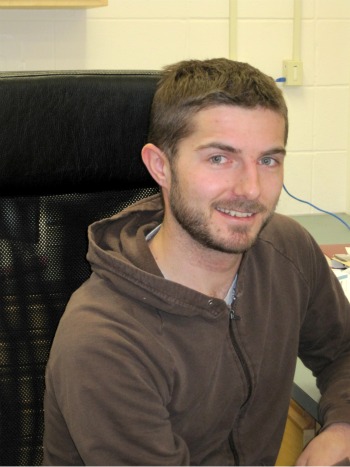
Nick Jendzjowsky's research is focused on the intensity of exercise training and vascular function
Along with five other international scientific bodies, the American Physiological Society will meet at the annual Experimental Biology Conference in San Diego of April this year. One of the attendees will be PhD candidate Nick Jendzjowsky, who is, by his own admission, having a very good year.
At the Experimental Biology meeting, Jendzjowsky will receive the Carolyn tum Suden/Frances Hellebrandt Professional Opportunity Award from the American Physiological Society. In addition to this honour he was also recently awarded a Killam Graduate Scholarship and the Dorothy J. Killam Memorial Graduate Prize last October. The Killam awards are arguably the University of Alberta's most prestigious of honours for graduate students and the Memorial Graduate prize is only awarded to the most outstanding of the Killam scholarship winners.
"The timing couldn't have been better," says Jendzjowsky. "I am fortunate to have had NSERC funding which ended last August and the Killam began in September." Like all graduate students, Jendzjowsky works hard and the scholarships enable him to completely focus on his work.
Jendzjowsky's doctoral research takes place in the Vascular Physiology Laboratory, under the supervision of Darren DeLorey. His research investigates the effects of exercise training on vascular function, specifically sympathetic nervous system regulation of peripheral blood vessels and arterial blood pressure.
The precise regulation of arterial blood vessels is essential for the adequate function of tissues and organs, as well as the maintenance of systemic arterial blood pressure. The maintenance of blood pressure and tissue blood flow is dependent upon a dynamic balance between the vasoconstrictor effects of the sympathetic nervous system activity (which reduces blood vessel size, decreases tissue blood flow and increases blood pressure) and vasodilator factors released locally by tissues (which relax blood vessels; increase tissue blood flow and reduce blood pressure).
A number of chronic diseases are characterized by vascular dysfunction and alterations in blood pressure. Exercise training has been associated with improved blood vessel function and a reduction in cardiovascular disease risk. However, our current understanding of how exercise training improves vascular function is limited. In addition, we have a limited understanding of how the individual components of a training program, namely the intensity, frequency and duration of exercise training affect vascular function and blood pressure control. As such, Jendzjowsky's research is focused on the intensity of exercise training.
One of the known benefits of exercise training on arterial function is improved vasodilation. This enhanced vasodilation appears to be mediated by an increased production of the powerful vasodilator nitric oxide. In addition to its role as a vasodilator, nitric oxide has also been shown to inhibit sympathetic vasoconstriction in contracting muscle. This reduction of sympathetic vasoconstriction has been specifically termed functional sympatholysis.
Cardiovascular diseases have been associated with heightened sympathetic vasoconstriction and reduced nitric oxide availability.
Jendzjowsky recently demonstrated that exercise training enhanced the inhibition of sympathetic vasoconstriction in a training-intensity dependent manner and through a nitric oxide mediated mechanism. This training adaptation may be a key component of the beneficial effects of exercise training on arterial function and may contribute to the cardio-protective effects of exercise training.
It is this research investigating the effects of exercise training on sympatholysis which has earned him the recognition of the American Physiological Society. Jendzjowsky will present his poster, "Short-term exercise training enhances nitric-oxide mediated functional sympatholysis" at the Experimental Biology meeting later this month.
The research currently conducted by Jendzjowsky and DeLorey will have the potential to improve current public health recommendations for physical activity and could have implications for cardiovascular disease prevention strategies, namely exercise training and rehabilitation programs.
"Nick is very deserving of these recent honors and I am very proud of him," says his supervisor Dr. Darren DeLorey. "I think it would be difficult to find a more dedicated or harder working graduate student than Nick. I believe the Killam awards reflect Nick's years of dedication to his studies and many outstanding achievements as a post-secondary student, whereas the American Physiological Society award recognizes the novelty and importance of his recent thesis studies."